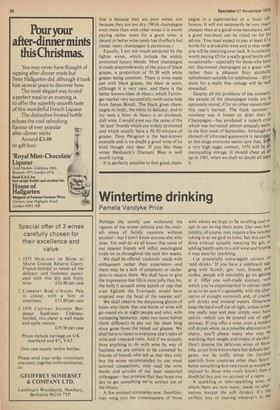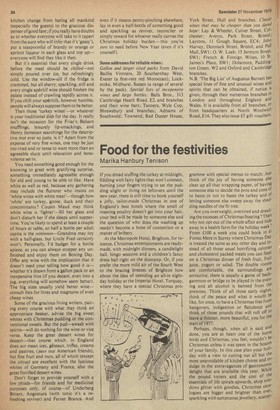Wintertime drinking
Pamela Vandyke Price
Perhaps the saintly can withstand the rigours of the winter solstice and the intersib stress of family reunions without alcohol—but I don't know anyone else who does. Yet well do we all know that some of our dearest friends will inflict oenological trials on us throughout the next few weeks.
We shall be offered 'cocktails' made with enthusiasm rather than experience—and there may be a lack of potplants or cachepots to receive them. We shall have to give the impression that life is most jolly (hey ho, the holly!) around some punch or cup that even Egfroth the Everready would have emptied over the head of the nearest serf.
We shall observe the deepening gloom of hosts who think that one bottle of wine will go round six or eight people and who, with increasing hesitancy, open two more halves (both different) to eke out the cheer long since gone from the tinted cut glasses. We shall have to listen to everyone else's tales of wine and vineyard visits. And if we actually have anything to do with wine by way of business we are certain to be cornered by friends of friends who tell us that they only buy the wines recommended by our most scorned competitors, only read the wine books and articles of our least respected colleagues—but promise that they hope one day to get something we've written out of the library.
A few pointed comments now, therefore, may wing into the consciousness of those
with whom we hope to be revelling and result in our loving them more. Our own hospitality, of course, may require a few notches taking in as we gird its loins, but this can be done without actually watering the gin, or adding health salts to a still wine and hoping it may pass for sparkling.
Cut potentially extravagant corners on 'odd drinks.' If you have a sideboard sagging with Scotch, gin, rum, brandy and vodka, people will inevitably go on getting at it. Offer one well-made mixture, with which you've experimented in calmer times so as to be sure it's agreeable, with the alternative of straight vermouth and, of course. soft drinks and mineral waters. Otherwise keep the hard stuff out of sight, unless someone really near and dear simply must have spirits—which can be poured out of sight anyway. If you offer a wine, even a modest still dryish white, as a possible alternative to sherry, you'll please many who may be watching their weight and intake of alcohol. Don't despise the delicious wines of Montilla, as yet little known here but definite bargains, nor be sniffy about the fortified aperitifs from countries other than Spain: better something first-rate (such as would be enjoyed by those who really know) than a doubtful buy just on account of a name. A sparkling or semi-sparkling wine, of which there are now many, needs no alternatives (except the soft drinks). It's the swiftest way of making whoever's in the
kitchen change from hating all mankind (especially the guests) to the gracious dis penser of good fare; if you really have doubts as to whether everyone will take to it (apart from the aunt who will infer that it's 'gassy'), put a teaspoonful of brandy or orange or apricot liqueur in each glass and top up— everyone will find they like it then.
But it's essential that every single drink before the meal should be chilled—not
simply poured over ice, but refreshingly cold. Use the window-sill if the fridge is crammed, but all sherry, sparkling, still and every single aperitif wine should freshen the palate instead of crawling tepidly across it. If you chill your apéritifs, however humble, people will always suppose them to be better.
Then those 'turkey wines'—or whatever is your traditional dish for the day. It really isn't the occasion for the Friar's Balsam snufflings. leisurely lip-smack ings, and Henry Jamesian searchings for the descrip tive mot ever so juste, is it ? Apart from the expense of very fine wines, one may be just too tired and or tense to want more than an agreeable slurp until relaxation and benevolence set in.
You need something good enough for the knowing to greet with gratifying surprise, something immediately agreeable enough for old and young to be able to like. Have white as well as red, because any gathering may include the flutterer who insists on 'white wines with white meat'—though how 'white' are turkey, goose, duck and their concomitants? Cousin Maud may think white wine is 'lighter'—fill her glass and don't disturb her if she sleeps until suppertime. You're likely to spend at least a couple of hours at table, so half a bottle per adult capita is the minintum--Grandma may toy with a half-glass, but Uncle Fred certainly won't. Personally, I'd budget for a bottle apiece, as you can always stopper any unfinished and enjoy them on Boxing Day.
Offer any wine with the implication that it doesn't need your telling how good it is— whether it's drawn from a gallon pack or an inexpensive litre (if you decant, even into a jug, everything will somehow seem better). The big sizes usually yield better wine— consult lists for litres and magnums of even cheap wines.
Some of the gracious living writers, pairing every course with what they think an appropriate beaker, advise the big sweet whites with Christmas pudding or the conventional sweets. But the pud—awash with spirits—will do nothing for the wine or vice versa. Keep the great dessert wines for dessert—that course which, in England does not mean ices. gateaux, trifles, creams and pastries, (pace our American friends), but fine fruit and nuts, all of which (except the citrus) are excellent with the luscious whites of Germany and France, also the great fortified dessert wines.
Don't forget to provide yourself with a few phials--for friends and for medicinal purposes only, of course—of Underberg Bitters, Angostura (with tonic it's a refreshing reviver) and Fernet Branca. And even if it means penny-pinching elsewhere, lay in even a half-bottle of something good and sparkling as reviver, reconciler or simply reward for whoever really carries the Christmas holiday burden—this you're sure to need before New Year (even if it's yourself).
Some addresses for reliable wines:
Gallon and larger sized packs from David Baillie Vintners, 20 Southernhay West, Exeter (a first-rate red Moroccan); Lockstoke, Midhurst, Sussex (a range of several by the pack). Special lists of inexpensive wines and large bottles: Balls Bros., 313 Cambridge Heath Road, E2, and branches and their wine bars; Tanners, Wyle Cop, Shrewsbury and branches; Adnams of Southwold; Townend, Red Duster House,
York Street, Hull and branches. Classic wines that ,nay be cheaper than you dared hope: Lay & Wheeler, Culver Street, Colchester; Averys, Park Street, Bristol; Laytons, 11 Gough Square, EC4; John Harvey, Denmark Street, Bristol, and Pall Mall, SW1; 0. W. Loeb, 15 Jermym Street, SW1; French & Foreign Wines, 10 St. James's Place, SW1; Dolamore, Paddington Green, W2 and Oxford and Cambridge branches.
N.B. 'The Big List' of Augustus Barnett has special lines of fine and unusual wines and spirits that can be obtained, if notice IS given, through their numerous branches In London and throughout England and Wales. It is available from all branches, or from headquarters at North Woolwich Road, E16. They also issue £5 gift vouchers.











































 Previous page
Previous page